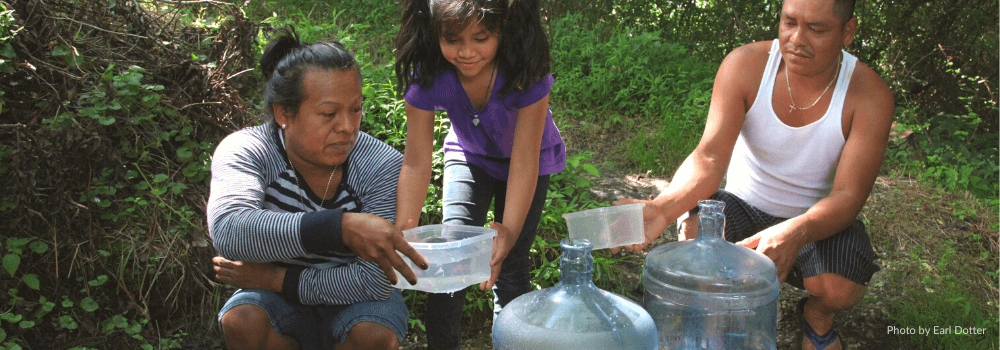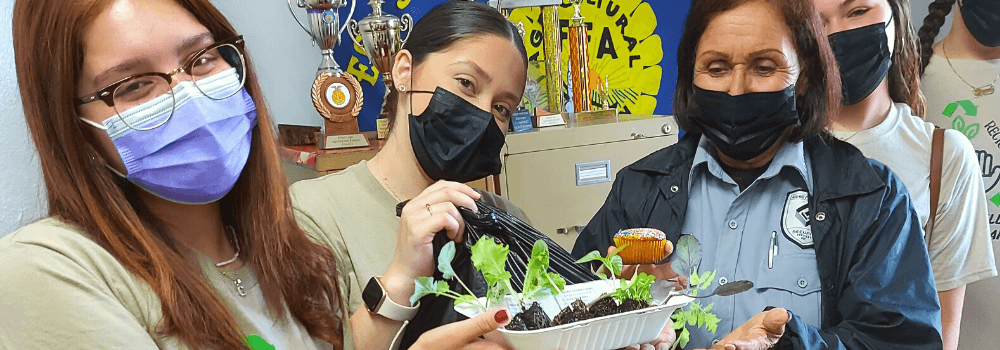Climate Justice

The climate crisis is the megaphone of inequities:it amplifies preexisting vulnerabilities and bears down the hardest on those already struggling. This is particularly evident during climate-fueled disasters. Isolated members of our communities – due to geographic remoteness, language, culture, immigration status, poverty, medical issues, or social disconnection – are frequently unaccounted for when a disaster strikes. Communities need to prepare for disasters, and build plans for response and recovery, with the most vulnerable at the forefront. Migrant Clinicians Network’s (MCN’s) climate initiative seeks to correct longstanding structural racism and environmental injustice by providing training, technical assistance, resources, and strategies to communities and community health centers (CHCs) for hyperlocal, hyper-inclusive responses to climate disasters. |
Explore topics |
Our History Fighting for Climate Justice
MCN facilitates culturally contextual, robust CHC emergency management planning; builds community engagement by bringing in community leaders to develop, review, and strengthen emergency action plans; and identifies and engages vulnerable populations like farmworkers, children, and isolated rural residents. But we aren’t just bringing partners together; we’re enabling stronger, more resilient communities. For example, we’ve learned plans must address the mental health and psychosocial needs of both vulnerable community members and CHC staff impacted by climate-related disasters. One tactic we offer is a climate prep intervention to build tools and resources for educating CHCs on the screening, monitoring, and evaluation of the emotional health and psychological distance from climate change as a result of local disasters. Other tactics include advocacy to raise awareness of climate-related health impacts and to foster stronger worker protections to prevent climate's long-term consequences on health, including heat-related illness and death.
Community Health Centers Lead Climate-Related Emergency Response
We activate our 35+ years of providing training and technical assistance to CHCs to guide them in expanding their reach to the most vulnerable. CHCs, with emergency infrastructure including generators and with mandated emergency plans already in place, can be key anchors to steady the community as the focal point for community mobilization during and after a climate disaster. While CHCs are tasked to prepare for typical emergencies within their walls, our new efforts: 1) pull clinicians out into the community and prioritize recognition of and care for those who are often overlooked or have limited care access; and 2) acknowledge climate risks and expand emergency preparedness in the context of a rapidly shifting climate reality.
Best Practices: How we support communities and health centers in addressing the climate crisis.
|
|
|
Our Research: Understanding the Impact of Climate Change and Disasters in Agricultural Communities in Puerto Rico.
MCN is exploring the impact of climate change and public health emergencies on agricultural workers and their families in central Puerto Rico. Understanding the impact and the social factors influencing them is essential for policymakers, clinicians, worker groups, and other stakeholders. Through these projects, we are working with CHCs, schools, and community leaders in the region to address the gaps, needs, and challenges when implementing climate resiliency initiatives. In addition, knowing the effect of recent emergencies and disasters on agricultural workers’ children can help them design evidence-based intervention strategies, and prevention programs.
|
|
Looking Ahead
In 2022, MCN was extremely successful in our efforts to support the development and improvement of skills to address the climate crisis and related emergencies. As part of our educational and outreach effort, we delivered five national webinars, several professional forum presentations, three learning collaboratives, and multiple hours of one-on-one technical assistance. In 2023, we will continue our efforts by offering collaborations and training on climate issues and best practices to mitigate its impact and push forward health equity. Among these, our training programs for emergency response workers and collaborative learning for school nurses supported by CDC Foundation stands out. Both programs seek to develop and improve the capacities of stakeholders to work with the community to mitigate the effects of climate change.
Learn More About Our Efforts
Peer-Reviewed Publications 2022
- Pagán-Santana M, Liebman AK, Seda CH. Deepening the Divide: Health Inequities and Climate Change among Farmworkers. J Agromedicine. 2022 Nov 18:1-4. doi: 10.1080/1059924X.2022.2148034. Epub ahead of print. PMID: 36384449.
- Pagán-Santana M, Liebman AK, López-Correa AY. Looking at the gaps and program needs to address the impact on children of agricultural workers in Puerto Rico during and after public health emergencies. Front Public Health. 2022 Nov 7;10:1046701. doi: 10.3389/fpubh.2022.1046701. PMID: 36419994; PMCID: PMC9677091.
- Grzywacz JG, Gonzales-Backen M, Liebman A, Marín AJ, Trejo M, Gudino CO, Economos J, Tovar-Aguilar JA. Attending to Pesticide Exposure and Heat Illness Among Farmworkers: Results From an Attention Placebo-Controlled Evaluation Design. J Occup Environ Med. September 2019. doi: 10.1097/JOM.0000000000001650.
Related Blogs
- Language Matters: Adapting Tools to Better Understand the Impact of Climate-Related Disasters on the Puerto Rican Agricultural Worker
- Wildfires and COVID-19: When Disasters Overlap, Agricultural Workers Struggle
- Disasters, Mental Health, and Puerto Rico: Interview with Dr. Lorena Torres
- Diabetes, Disasters, Late Night Outreach: The Life of a Migrant & Neighborhood Health Nurse in North Carolina
- Hypertension During Disasters -- Lessons from Puerto Rico
- Urgent Care During Migration, Interrupted by a Hurricane
Resources to Address Climate Impact
- Heat-Related Illness Clinician’s Guide (Available in English and Spanish)
- Environmental Education [Videos, Resources and Curriculum] (Available in English and Spanish)
- Heat-related Illness and Farmworkers - Training Curriculum and Facilitator Guide (Available in English and Spanish)
- Heat-related Illness Webpage (View MCN's heat-related illness webpage for more resources)
Advocacy and Media
- Regional Heat Stress Standard to Protect Workers
- Climate Mitigation in Puerto Rico
- Action on Climate
- Calling for Federal Heat Standard for Workers
- Protecting Farmworkers from Heat
Learning Opportunities
- It’s Hot and It’s Dangerous! A Webinar for Community Health Workers to Learn about Heat Related-Illness and How to Help Prevent It. [Recorded Webinar ENG]
- Antes de los días de verano, aprenda cómo los Promotores de Salud pueden ayudar en prevenir enfermedades a causa del calor
- Environmental Justice Symposium: Health Challenges of Farmworkers Impacted by Climate Change

